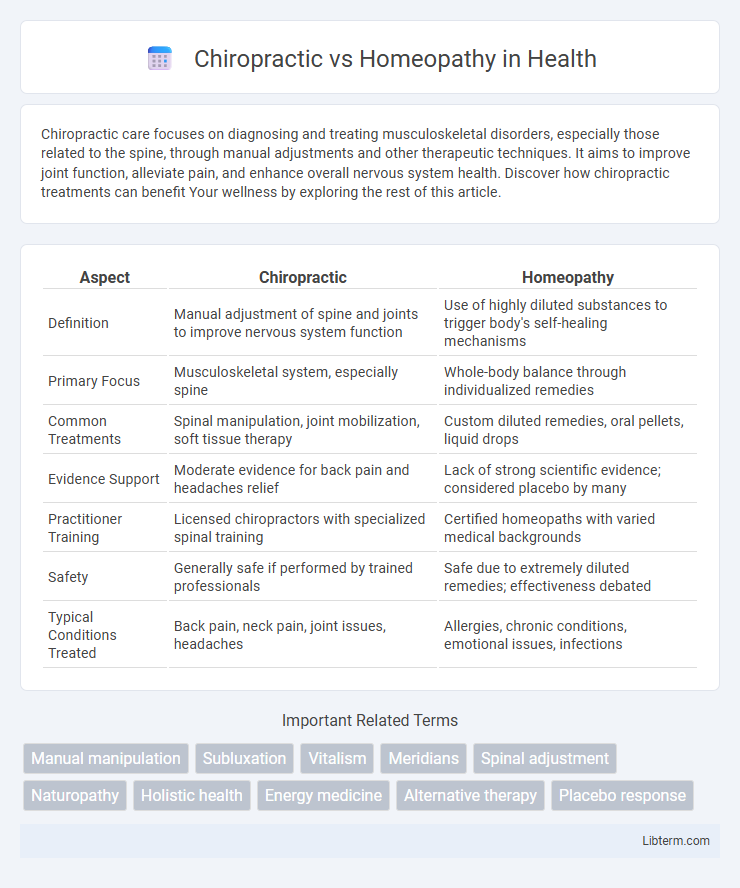Chiropractic care focuses on diagnosing and treating musculoskeletal disorders, especially those related to the spine, through manual adjustments and other therapeutic techniques. It aims to improve joint function, alleviate pain, and enhance overall nervous system health. Discover how chiropractic treatments can benefit Your wellness by exploring the rest of this article.
Table of Comparison
| Aspect | Chiropractic | Homeopathy |
|---|---|---|
| Definition | Manual adjustment of spine and joints to improve nervous system function | Use of highly diluted substances to trigger body's self-healing mechanisms |
| Primary Focus | Musculoskeletal system, especially spine | Whole-body balance through individualized remedies |
| Common Treatments | Spinal manipulation, joint mobilization, soft tissue therapy | Custom diluted remedies, oral pellets, liquid drops |
| Evidence Support | Moderate evidence for back pain and headaches relief | Lack of strong scientific evidence; considered placebo by many |
| Practitioner Training | Licensed chiropractors with specialized spinal training | Certified homeopaths with varied medical backgrounds |
| Safety | Generally safe if performed by trained professionals | Safe due to extremely diluted remedies; effectiveness debated |
| Typical Conditions Treated | Back pain, neck pain, joint issues, headaches | Allergies, chronic conditions, emotional issues, infections |
Understanding Chiropractic and Homeopathy
Chiropractic focuses on diagnosing and treating musculoskeletal disorders, primarily through spinal adjustments and manual therapies to improve nervous system function and relieve pain. Homeopathy uses highly diluted substances aimed at stimulating the body's self-healing mechanisms, based on the principle of "like cures like." Both approaches emphasize holistic care but differ significantly in methodology, scientific support, and treatment application.
Historical Backgrounds of Both Therapies
Chiropractic originated in the late 19th century, founded by D.D. Palmer in 1895, emphasizing spinal adjustments to improve nervous system function. Homeopathy was developed earlier, in the late 18th century by Samuel Hahnemann, based on the principle of "like cures like" and using highly diluted substances for treatment. Both therapies emerged as alternatives to conventional medicine, reflecting distinct historical approaches to healing and health maintenance.
Core Philosophies: How They Differ
Chiropractic centers on diagnosing and treating musculoskeletal disorders, primarily through spinal adjustments that aim to restore nervous system function and improve physical health. Homeopathy operates on the principle of "like cures like," using highly diluted substances to stimulate the body's natural healing processes based on individualized symptom patterns. While chiropractic emphasizes structural alignment and nervous system optimization, homeopathy focuses on holistic symptom matching and energetic balance without direct physical manipulation.
Treatment Methods and Techniques
Chiropractic treatment primarily involves manual spinal adjustments and manipulations aimed at improving musculoskeletal function and relieving pain. Homeopathy utilizes highly diluted substances to stimulate the body's self-healing processes based on the principle of "like cures like." While chiropractic focuses on physical interventions targeting the nervous system, homeopathy emphasizes individualized remedy selection based on a patient's specific symptoms.
Conditions Treated: Chiropractic vs Homeopathy
Chiropractic primarily targets musculoskeletal conditions such as back pain, neck pain, and joint dysfunction through spinal adjustments and manual therapy. Homeopathy addresses a broader spectrum of ailments, including chronic illnesses, allergies, asthma, and mental health issues, using highly diluted natural substances to stimulate the body's self-healing processes. Both modalities offer complementary approaches but differ significantly in their treatment methods and underlying philosophical principles.
Evidence and Scientific Support
Chiropractic care is supported by a moderate body of scientific evidence, particularly for treating musculoskeletal conditions like lower back pain, with numerous clinical studies validating spinal manipulation as an effective therapy. Homeopathy lacks robust scientific support, as extensive research and systematic reviews consistently show its principles contradict established pharmacology and fail to demonstrate efficacy beyond placebo effects. Evidence-based guidelines from major health organizations recommend chiropractic interventions for specific pain-related conditions while generally advising against homeopathic treatments due to insufficient proof of therapeutic benefit.
Safety and Potential Risks
Chiropractic care involves spinal manipulation and physical adjustments that can cause mild side effects like soreness or headaches but rarely serious complications when performed by licensed practitioners. Homeopathy, based on highly diluted substances, generally poses minimal direct physical risks but may delay proper medical treatment if used as a substitute for conventional care. Both approaches carry safety concerns primarily related to the practitioner's qualifications and the potential neglect of evidence-based medical interventions.
Regulatory and Professional Standards
Chiropractic care is regulated by professional boards in many countries, requiring licensed practitioners to adhere to evidence-based standards and undergo rigorous training and certification. Homeopathy regulation varies widely, often lacking standardized professional requirements and consistent oversight, leading to debates over its legitimacy and safety. Regulatory frameworks for chiropractic emphasize clinical accountability and patient safety, whereas homeopathy faces challenges in establishing uniform professional standards globally.
Patient Experiences and Satisfaction
Patient experiences with chiropractic care often highlight significant improvements in musculoskeletal pain, particularly for back and neck issues, with satisfaction rates exceeding 80% in multiple studies. Homeopathy patients frequently report mixed outcomes, with some noting symptom relief while others express skepticism about efficacy, resulting in lower overall satisfaction compared to conventional therapies. Chiropractic care's hands-on approach and measurable physical improvements contribute to higher patient trust and repeat visits, whereas homeopathy's individualized remedies appeal to those seeking alternative treatments despite limited clinical evidence.
Choosing the Right Approach for You
Chiropractic care focuses on diagnosing and treating musculoskeletal issues through spinal adjustments, providing relief for back pain and improving nervous system function. Homeopathy uses highly diluted natural substances to stimulate the body's healing response, emphasizing individualized treatment for a wide range of chronic conditions. Choosing the right approach depends on your specific health needs, symptom severity, and preference for either physical intervention or holistic remedies, with consultation from licensed practitioners recommended.
Chiropractic Infographic

 libterm.com
libterm.com